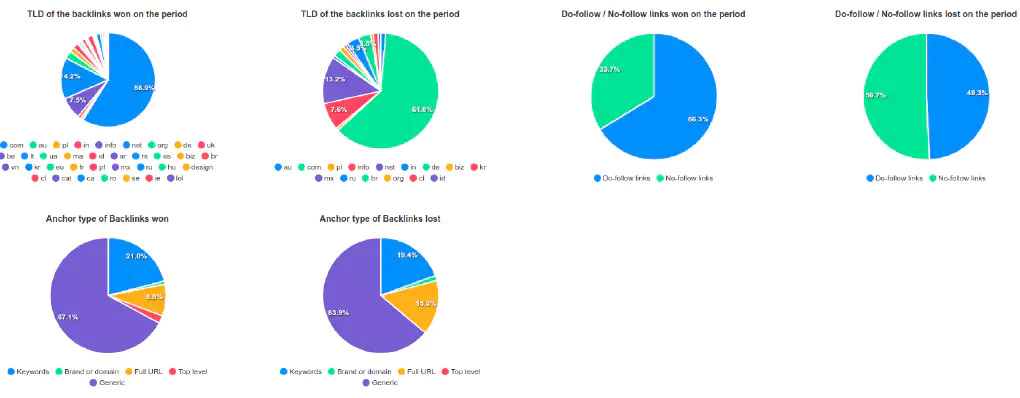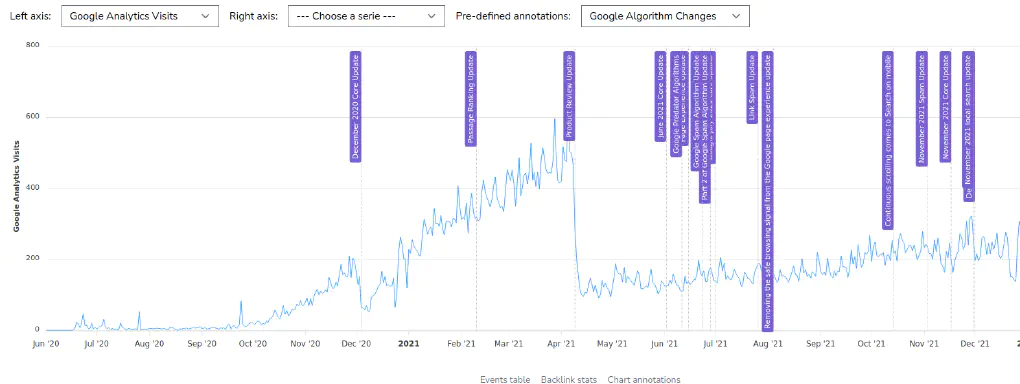Buying a website can be tricky as there are a lot of scams around there. Investing in websites is a profitable business if done correctly, but it’s also risky as there are many pitfalls. Therefore, when you invest money, you need to check every aspects of the business you want to buy to avoid some mistakes. In this post, we collected from our experience the top-10 mistakes to avoid. These have been “field-tested” mistakes that we made in the past, when we were beginners. Keeping them in mind will enable you to reduce the risk of website investing drastically.
1. Being disorganized
When you start to analyze a website, you will get a ton of information and questions flowing in your head. This is really important to stay well organized, otherwise you will inevitably forget some elements. With digital tools, it’s easy to be organized, you can use your favorite note-taking application (like Notion.so or something like that) or the included tools included with Website Due Diligence. What we recommend is to always have several sections in your notepad:
- KPI’s of the website
- Questions to ask to the seller, and the answers
- Information about the seller
- A file repository
- A section where you can note everything you learn about the website
- A “learning” section, where your note what you can improve in your process, or any new tool you discovered during the due diligence process
In addition to this, you can also timestamp everything, from the start of the diligence process, to all exchanges with the seller. This would allow you, at the end of the process, to see what have been the bottlenecks. As you know, making a good investment is a question of numbers: more you analyze websites, better it is as it will allow you to identify a profitable gem. The process of buying a website is similar to the real-state sector: you will never buy the first house you visit, and you need to know the market before investing your money. This is why it is important to be efficient, rational, but also fast to discard any website quickly to go to the next one.
2. No investigation on the seller
We put this mistake in a top position as it is often underestimated. Investing in a website is not only a technical question, but also a question of trust between you and the seller. Again, it is like the real-estate sector: you would never buy a house from a strange guy hiding himself behind a fake identity. This is why you need to investigate very deeply on the seller. Often, at the start, you’ll only have a nickname and the URL of the website. From this starting point, you need to act like a private detective.
You can start from the legal notice of the website, and Google the name displayed, if any. You can also see if there are other websites belonging to the owner on the server where the site is hosted, using free tools like DNSlytics. Recently, using this tool, we identified all the websites belonging to the seller. He was surprised, and ask us how we did that. This is always good to show the seller that he will not be able to escape easily if he scams you.
Also, you can get some information about the seller on social medias. If the website has a corresponding Twitter account, check the first tweets of this account. It may happen that the first tweets of the account are retweeted by the owner to increase the visibility of the first tweets, enabling you to get the Twitter account of the seller even if he uses a fake identity.
It’s not always possible to find the real identity of the seller by yourself, but if it happens keep it for yourself. It will be the ultimate scam test when you’ll ask later to the seller his real name to sign the selling agreement.
Also, if you managed to get his identity, try get more information: living location, technical or SEO skills, pictures, email addresses, phone numbers, etc. Note everything, if he scams you, you’ll get everything to put pressure on him.
3. Staying impersonal with the seller
Buying a website is also a question of trust. It’s always better to build a relationship with the seller, by not staying too impersonal. Being friendly, natural and curious has many advantages.
One of the first benefit is that the seller will be more transparent once he knows you. He may admit some drawbacks on the website he sells, or explain what has been his strategy when he built the website.
It can be also useful to beat the competition: you may not be the only potential buyer. By building a personal relationship with the seller, you may be favorized by the seller as he will prefer to sell his “baby” to a person he trusts. If this is a scammer, he may also prefer to scam another person rather than “this friendly guy who laughed with him during a Skype call”.
Building a friendly relationship is a massive weapon to get more details about the business sold. This cannot be built with email exchanges only, you need defintely to plan some Skype calls, and try to build trust. For the first confcall, if he turns on his webcam, do the same, never hide yourself.
During the calls, make implicit tests based on the information you collected about him, but without insistance. See if what he says fits the elements you got before.
One key element to keep in mind is to understand that you are sharing with him the same interest for SEO, internet marketing, and technical stuff. Therefore, it’s not unusual to talk about broad subjects that have nothing to do with the selling of the website, and this is perfectly fine. You can learn a lot from him, and he can learn a lot from you. Be interested about his further projects, without being too invasive. Recently during a call, the seller disclosed all his internet marketing revenues with us and how he built his business.
Finally, don’t fall into a common pitfall. Once your build a relationship with the seller, do not trust him too much. Keep in mind that he may still scam you. You need to stay organized in your due diligence process, filling your checklist item by item, whatever he told you.
4. Not recording Skype calls
This is a common mistake. Always record the skype calls. Recording the screen is more important than the voice. Why? Because during Skype calls, you will always ask for some proofs and review the backend of the website. Therefore, the seller will have to share his screen, and this is almost always a massive leak of information in itself, as it will allow you to instantly judge his technical skills.
Don’t be shy and ask to review a lot of stuff, even the ones that you can check yourself. The goal is not to get the information you ask, but to get other related information. Some examples:
- Ask to review the list of the followers of the website Twitter account. This may enable you to see his real Twitter account.
- Same thing for Facebook
You can even be more tricky. Usually, the mailbox can show a lot of information about the seller, as you will see the subject of the emails. So, prior to the call, you might send him an email with a link (personally I send him the URL of a strange backlink), and then incitate him during the call to review it with you. That will force him to find the email in his mailbox. On a recent sell, this trick allowed us to see all his email addresses, typically one per website he owned. This was very inspirating as he had a lot of websites, and getting the list helped us to understand its full business and revenue streams.
Obviously, he will try to be fast so you cannot read everything. But if you are recording the Skype call, an exposure during one second is enough for you.
5. Think that Wordpress is always easy
Wordpress is known as easy, but for some websites it can quickly be the opposite. Depending of the level of the seller, it might be even a nightmare if you don’t have enough development skills to maintain the website correctly. This is why it’s always important to review any custom code during a Skype call. Once, reviewing the custom code was enough for us to discard the website, as it was really too complex and ugly, preventing the blog to be updated.
This can be a huge mistake to think that Wordpress is always manageable technically, and this is particularly true if you are not a developer or if you don’t have particular skills on the Wordpress technical architecture. So beware of that, and know your limits.
One potential red flag is if the seller modified a theme without creating a child theme, or directly the code of plugins.
Also, always ask if some plugins or theme have been “nulled”, meaning that the seller has installed hacked versions. This is not only a legal issue, but usually nulled plugins and themes contain a malware.
6. Assuming that checklists are enough
Buying a website requests a lot of due diligence. Most of items to check can be done quickly, but you should never think that checklists are enough to make a proper due diligence process. Don’t forget the overall goal: you need to understand the history of the website. You need to detect what has been done on the website, and how the seller may try to scam you.
This requires thinking and cross-checking between various elements. Buying a website is not similar to an audit: this is an investigation aiming at discarding a website as quickly as possible.
Therefore, you need to spread your thinking among several days, and think about all possible ways the seller may scam you. It is like a puzzle: you should see the overall picture but you don’t have access to all the pieces of the game.
The way to buy a website relies a lot on your personality. Some people will have new hypotheses to check while walking far away from the screen, while others will do everything in front of their computer. Keep in mind that each detail is important, so take your time to really think. Did you see a 301 redirect pointing to the website? Check what is it for, take into account this new element in your overall thinking, and make and check new hypotheses.
7. Failing to analyze the content correctly
You need to take the time to read the existing articles of the website. Be attentive to the grammar and syntax, the wording, and the SEO aspects. Also, always check if the text has been copied from another website. It can be tricky as most of people often forget that the content may have been copied from a website in another language. if the owner is honest, he will tell you that, but don’t forget to ask the following questions:
- Who wrote the articles?
- How do you find new ideas?
- How do you structure your articles?
- Etc.
The goal here is to understand the writing process, and what has been the content strategy. It is often rewarding to ask these questions, as the seller may disclose some other websites that have been used to get new ideas.
8. Not thinkink deeply on further developments and opportunities on the website you buy
Buying with too few ideas to increase the revenue is a mistake. You should have several axes of development, either for the content, design, backlinks, or monetization.
One important point is the domain name in itself. Some domain names are too restrictive to allow for an “horizontal development” of the niche. Also, some domain names don’t age well. For instance, we have a negative opinion about all domains containing the word “review”, as they restrict the content to… reviews, despite mixed content (purely informational vs product reviews) is usually better.
EMDs (Exact Match Domain) are also old fashion nowadays, despite it may remain interesting. The good old days where you can rank a website because of its domain name are over. You need to think more broadly and establish a strategy to develop the website.
Content development
For the content in itself, the development can be at two levels:
- Horizontal development: writing content about linked topics to extend the niche.
- Vertical development: writing deeper content on the current niche.
The format of articles can also be an axis to develop the website further. Mixing informational and review content can be a good strategy, as well as regrouping several articles into one to increase the strength of a thematic.
Design
You need to spot some design errors and quick-wins. Usually, some minor modifications may be enough to increase your revenues. For review websites, a typical axis is to focus on the comparison table, which is often misplaced or have too much information. These are potential quick-wins.
Monetization
Always ask yourself if there is additional products you can sell with the website. Amazon affiliate links are good, but that’s not so rewarding. Are partnerships with other product owners possible? Try to see if you will be able to make additional deals and see if there are better options that the current monetization streams.
Backlinks
You should also have a strategy to get new backlinks. Obviously, buying a SEO service on Fiverr is not a good option, you need to take control of your backlink strategy and have a clear vision on how you will chase them. Think about guest posts, backlink exchanges, and so on. Try to identify which actors may be interested to put a backlink on their website and what will be the incentive.
9. Be stingy on your investment
You should not be afraid to spend money, this would be a mistake. Beside of the budget needed to buy the website in itself, keep in mind you will need to pay plugins, themes, hosting, and writers. Don’t be greedy by negotiating with the seller the transfer of a plugin’s licenses. Buying a website is an investment, you need to have enough money to bet on the future, and you don’t want to be shy. If you buy a website, you will need to trust in yourself and exploit the potential of the website fully. This requires money.
10. Not securing the buying process
A golden rule: the buying process should always involves a third-party. It can be the broker, or an independent service like escrow.com. Again, don’t be stingy: paying a third-party is always better than trying to save a few hundreds dollars and taking risks of being scammed. However, you can ask to the seller to split the cost of the Escrow or third-party service. Most of all will accept.
Also, always sign a contract with the seller. It is always good as it will force the seller to give its identity and full postal address. It is even better to do it with the broker, as the broker will ask for an ID card.
Conclusion: Buying a website is like buying a real-estate property
The good mindset to have when investing in a website, is that it’s more similar to buying a house than buying something on Ebay. You need to take the needed time to analyze the property, to ask questions to the seller, to allocate money not only for the property but also for the renovation, and secure the transaction with a third-party.



